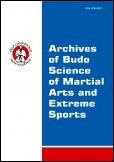2013, Volume 9, Issue 1
Judo as a supplementary form of therapy for children with mental retardation
Dariusz Boguszewski1, Beata Świderska2, Jakub Grzegorz Adamczyk1, Dariusz Białoszewski1
1Rehabilitation Department, Medical University of Warsaw, Warsaw, Poland
2Students Science Club, Rehabilitation Department, Medical University of Warsaw, Warsaw, Poland
Full text
Abstract
Background and Study Aim: Children suffering from mental retardation tend to spend most of their time at home or in hospital. Therapists should, therefore, seek ways for them to contact the outside world (animals, peers). Similarly to their healthy peers, handicapped children should have the possibility of fulfilling their hobbies. Apart from rehabilitating, non-standard forms of therapy help shape the child’s interests, develop the child’s passions. Hence, the primary cognitive goal of the research was the effectiveness of judo sessions as a supplementary therapeutic method dedicated to children with mental retardation.
Material and Methods: The research was carried out on a group of 73 children. Their average age was 11.7 (SD=2.6). The condition of all children was constantly monitored and supervised by medical doctors and physiotherapists. Over 35 of them attended judo classes conducted as part of their therapies. The majority of children (59%) were characterized by mild mental retardation. The diagnostic poll method was applied in the research. The research tool was an authorial survey filled in by the parents of children suffering from mental retardation. The survey comprised of 21 questions concerning the child’s physical fitness, locomotion lesions, self-care and visual-motor coordination from the beginning of the classes.
Results: Children attending judo classes made considerable progress in their ability to communicate with the environment. Improvement was also noted in the area of self-confidence and assertiveness. Differences between the judo group and the control group were statistically significant (p<0.001). However, distinguishable differences were not recorded in the area of pronunciation and word choice. On the other hand, patients attending judo classes exhibited considerable improvement in the ability to communicate with the environment, in the lifestyle (the ability to function within the home and neighbourhood), and in the level of socialization (the knowledge of standards and principles, as well as abiding by them, control of emotions), (in average, over 3 points – in a five-point scale). These differences were statistically significant (p<0.001), in reference to the comparative group. Self-care abilities (care for proper hygiene and appearance) as well as self-reliance and independence (decision-making, problem-solving) were graded, in average, at 2.5 points.
Conclusions: 1. The therapeutic value of classes in judo dedicated to children with mental retardation has not been recognized yet. However, the results achieved by a group of patients attending them clearly indicate their high effectiveness, which only confirms the primary goal of judo as a utilitarian form of movement. 2. The evaluation of therapy performed by parents clearly indicated considerable differences between the standard and non-standard therapy methods (for the benefit of judo). This only justifies the need to apply alternative forms of therapy in mentally handicapped children.
Key words: disabled sport, down syndrome, mental retardation, judo





